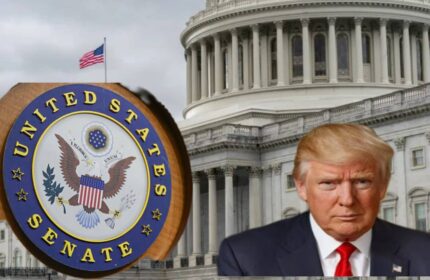The United States Senate has successfully averted a government shutdown by passing a Republican-led six-month spending bill that maintains most federal spending at 2024 levels while granting the administration flexibility to downsize agencies. The bill, which now awaits President Donald Trump’s signature, narrowly passed the Senate with a 62-38 procedural vote before securing a final 54-46 approval.
The legislation faced strong opposition within the Democratic Party, with many lawmakers arguing that it allows the Trump administration to restructure federal agencies aggressively. Despite this, Senate Minority Leader Chuck Schumer and nine other Democrats broke ranks to support the bill, citing concerns that a shutdown could further weaken Democratic negotiating power.
Defense Spending Rises as Non-Defense Funds Slashed
One of the most contentious elements of the bill is the increase in defense spending by $6 billion, while non-defense discretionary funding faces a $13 billion reduction. The cuts are expected to impact social welfare programs, education, and healthcare initiatives that Democrats have long championed.
Additionally, the bill grants a slight increase in funding for Immigration and Customs Enforcement (ICE), a move that has further alienated progressive lawmakers who oppose Trump’s aggressive immigration policies. Senator Ted Cruz, a strong supporter of the measure, dismissed Democratic concerns, calling their opposition “political theater” and praising the bill’s passage as a victory for national security.
Democratic Backlash and Threats to Schumer’s Leadership
The bill’s passage has triggered a wave of internal frustrations within the Democratic Party. Several lawmakers, particularly from the progressive wing, have criticized Schumer’s role in advancing the legislation. Representative Alexandria Ocasio-Cortez condemned Schumer’s willingness to let the bill proceed, calling it a “huge slap in the face” and accusing Senate Democrats of “codifying chaos and reckless cuts.”
Some Democratic activists and lawmakers have even suggested supporting primary challengers against Schumer in future elections, arguing that his actions undermine efforts to protect federal agencies from being dismantled under the Trump administration. However, Schumer defended his decision, arguing that allowing a shutdown would have given Trump even greater leverage to make drastic changes.
Tariff Powers Strengthened, Raising Congressional Concerns
Another controversial aspect of the legislation is its provision preventing Congress from voting to end emergency declarations that enable Trump’s tariffs on Canada and Mexico. This clause could potentially allow the administration to extend tariff policies to other nations without congressional approval.
Democratic House members have strongly criticized this measure, warning that it further erodes congressional authority over trade policy. Some lawmakers view it as an unprecedented shift of power toward the executive branch, raising concerns about potential long-term economic and diplomatic consequences.
Trump and Republicans Celebrate Legislative Victory
The passage of the bill marks a significant win for President Trump and congressional Republicans, who have been pushing for fiscal reforms that align with their broader agenda. In a rare moment of bipartisan praise, Trump commended Schumer for allowing the bill to advance, stating that failure to pass it would have been “a country destroyer” while its approval would help the U.S. reach “new heights.”
Republican leaders have lauded the spending bill as a responsible measure that ensures government continuity while making necessary fiscal adjustments. As the bill awaits Trump’s signature, its long-term impact on federal agencies, trade policies, and Democratic Party unity remains uncertain. However, one thing is clear: the battle over government spending is far from over.














